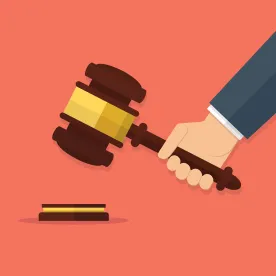Want to Appeal? The Odds Aren’t In Your Favor
Deciding whether or not to appeal isn’t easy. It will take considerable time, buckets of money and the odds aren’t even 50/50. Winning on appeal, however, can be life-changing for the client and a major career boost for the attorney.
Appeal courts vary as to how long the appeal should take and the likelihood of success.
Criminal Appeals
In 2015, the U.S. Dept. of Justice analyzed almost 70,000 criminal appeals in state courts.
-
63% of all appeals will be reviewed on the merits – only 19% succeed.
-
Courts of last resort dismiss more appeals and reverse fewer opinions.
-
Reversals are least likely for the most serious offenses – the reversal rate for murders was only 17%.
-
Appeals typically take an average of ten months.
Patent Appeals
-
A patent appeal sent to the Federal Circuit in 2016 will leave you cooling your heels 15 months.
-
3 out of 4 appeals lost.
Federal Criminal Appeals
If you lost a federal criminal case and decided to appeal, it’s an uphill battle.
- Only 5.6% of convictions are reversed.
- 74% of the time, judges agree on the brief, not oral arguments.
Know and meticulously follow ALL of the court’s rules. You wouldn’t want your brief dismissed because you used the wrong font or didn’t bind documents correctly. Court clerks live for tossing briefs back to unhappy lawyers.
7 Significant Appeals
-
United States v. Carroll Towing Co.: In 1947, Judge Learned Hand devised the Hand Test, a way to determine the standard of care when negligence is involved. Connors Co. owned a barge and hired Carroll to do some work. Carroll readjusted the mooring lines. When no one was aboard, the barge broke loose, hit a tanker and sank. Both trial and appeal courts divided damages. This case ruled someone is liable if they don’t take reasonable precautions even when there’s little probability of injury.
-
United States v. One Package of Japanese Pessaries: This appeal influenced public access to contraceptives. The 1873 Comstock Act prohibited “obscene matter” from being imported or mailed, including contraceptives. A physician employed by the activist Margaret Sanger ordered a Japanese pessary (diaphragm) from a Tokyo doctor. It was confiscated on arrival. The government lost and appealed to the Second Circuit. Sanger won the ruling that a shipment from a physician shouldn’t be interfered with. The ruling also said it was inconsistent to forbid contraceptives when this made illegal abortions more likely to occur.
-
Suntrust v. Houghton Mifflin Co.: Suntrust was the trustee of the Mitchell Trust, holding the copyright for Gone With the Wind. Suntrust sued Houghton for publishing a parody, The Wind Done Gone. The appeals court agreed with the lower court that a well-crafted parody counted as fair use. This ruling was later extended to cover Live Crew’s unlicensed use of a Roy Orbison bass line and became binding precedent in the Eleventh Circuit.
-
Pro-Football, Inc. v. Harjo: This case caused countless heated discussions as to whether the Washington Redskin’s famous logo of a feathered warrior disparaged Native Americans. In 1992, Harjo asked the Trademark Trial and Appeal Board to cancel the Redskin’s logo registration. The petition was granted. The Redskins appealed to U.S. District Court, overturning the logo cancellation. The legal fight continued, generating comments from Congress and President Obama. Ultimately, a favorable Supreme Court ruling in a different case ended the long battle in the Redskin’s favor.
-
Hopwood v. Texas: Cheryl Hopwood and three other white plaintiffs were denied admittance to the University of Texas School of Law because of the university’s equal protection policy. Hopwood claimed reverse discrimination. The Fifth Circuit ruled in Hopwood’s favor in 1996, declaring race couldn’t be used as an admissions factor. The Supreme Court declined to hear the university’s appeal. For seven years, Hopwood ruled the university’s admissions policy. However, in 2003, the Supremes ruled in Grutter v. Bollinger that the University of Michigan Law School could narrowly use race to achieve a diverse student body.
-
Dettmer v. Landon: This case represented the first time a court recognized Wicca as a religion. Dettmer was a Wiccan and a prisoner. He sued over access to ritual knives, based on his First Amendment rights. The prison claimed Wicca wasn’t a religion and didn’t want to give a prisoner knives. Dettmer won. The Va. Dept. of Corrections appeal. The Fourth Circuit ruled Wicca was a religion, but the knife ban didn’t violate Dettmer’s beliefs. He was probably unhappy with his partial win.
-
Glik v. Cunniffe: Simon Glik was arrested by Boston police officers and charged with wiretapping and helping the prisoner escape after recording a public arrest. Charges were eventually dismissed. Glik filed a civil rights lawsuit. The police officers motion for dismissal was denied, and they appealed. The First Circuit unanimously ruled Glik’s constitutional rights were violated. Glik, an attorney, didn’t survive unscathed. Pending criminal charges had made it hard to find a job as a prosecutor.
Appeals are far from easy. They can be a defendant’s last chance. Appeal rulings become precedent, having a significant influence on future decisions and society as a whole.




 />i
/>i

